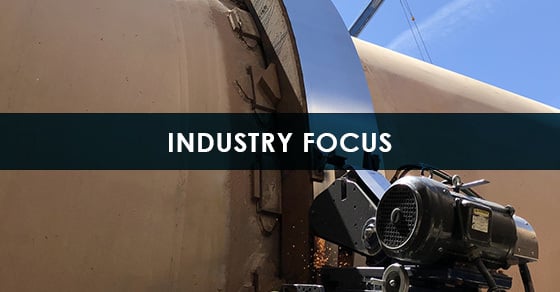Incinerators across the United States and abroad are preparing for a tidal wave of medical waste from the COVID-19 pandemic, with some countries already in the thick of it. As waste management companies prepare for the increased demand, we’ve put together the list below on essential maintenance practices to keep your rotary kiln incinerator running properly and efficiently during this high-demand crisis.
The Rotary Kiln Incinerator for Medical Waste
The use of rotary kiln incinerators has been increasing in recent years as both the amount and the diversity of waste produced continues to grow.
Rotary kilns are employed in high-capacity settings, processing up to 3,000 lb/hr around the clock. Capable of accepting multiple types of waste in the same unit, they are an ideal fit for centralized operations in high-demand markets.
As a Category B infectious substance, COVID-19 medical waste is treated in the same manner as other Category B infectious substances and requires no additional measures of decontamination; the collected waste is incinerated in the rotary kiln and the remaining decontaminated char landfilled.
Service Requirements for Rotary Kiln Medical Waste Incinerators
As a substantial piece of capital equipment, properly maintaining a rotary kiln incinerator is always important to protect the investment, but it is especially critical during times of high demand when unexpected downtime wreaks havoc on a facility. Many waste management companies that were previously putting off maintenance and repairs are finding themselves scrambling to prepare their kilns for the coming onslaught of medical waste from the virus.
Follow the guidelines below to keep rotary kiln incinerators running their best during the COVID-19 pandemic.
Mechanical Incinerator Maintenance
The mechanical components of a rotary kiln incinerator should be well cared for to maximize the unit’s longevity. When working with rotary kilns, many of the mechanical components are interrelated, so keeping them all running properly is essential to the overall life of the unit.
Tire & Trunnion Wheel Repair and Replacement
Tires (also known as riding rings) and trunnion wheels serve as the skeletal support of the rotary kiln, while also facilitating proper and smooth rotation. As the primary support of the kiln, when tires and trunnions begin to wear, the system quickly becomes unbalanced, putting added strain on other mechanical components.
To minimize potential damage to the system, wear on tires and trunnions should be addressed as quickly as possible. Minimal-to-moderate wear is often easily resolved through tire and trunnion grinding – a resurfacing process that grinds away the damaged portion to leave a smooth, refinished surface in like-new condition.
A grinder restores the surface of a rotary kiln tire (riding ring)
Alignment
Rotary kiln alignment refers to the axial alignment of the kiln so that weight is properly distributed and no unnecessary strain is put on components. Additionally, alignment ensures that the drum “floats” properly between thrust rollers.
As with the tires and trunnion wheels on a rotary kiln incinerator, the alignment of the kiln has a compounding effect on other kiln components, so minimizing misalignment is an important aspect of kiln maintenance.
Rotary kiln incinerators naturally fall out of alignment over time, so routine laser alignment is recommended to keep the unit in optimal working condition. Misalignment can also occur as a result of other factors, such as tire or wheel damage, or contact with the thrust rollers. A realignment should also be conducted after any major repairs have been made.
Gear Replacement
Incinerators using the gear and pinion drive assembly must maintain proper lubrication and gear mesh to keep the kiln in good working condition. A worn girth gear can result in several problems, so replacing it as soon as wear is noticed is critical in preventing further damage.
Kiln Seals
Maintaining a proper seal and limiting the amount of air leakage into the kiln system is an important part of assuring that the process conditions in the kiln are optimized. Poorly maintained or leaking kiln seals can result in poor combustion of the waste materials and put additional duress on the burners and downstream air pollution control equipment. It can also limit or reduce the processing capacity of the kiln system. FEECO provides several different styles of kiln seals and our customer service engineers are familiar with all of the varieties of kiln seal systems utilized in incineration applications.
Equipment Audits
To help ensure that rotary kiln incinerators are capable of meeting the increased processing requirements without issue, plant managers may benefit from the assistance of an equipment audit conducted by a trained professional.
An equipment audit, such as those offered by the FEECO Customer Service Team, assesses the overall mechanical condition of the kiln, identifying any potential issues and providing recommendations on what needs repair or replacement to maximize online availability.
This includes evaluating the condition of all mechanical components in the system, as well as the drum shell, refractory system and any ancillary equipment such as feeders, seals, and combustion systems.
Process Optimization
The composition of infectious or clinical waste can have a wide variability based on the type of facility generating the waste materials. As a result, as the volume of infectious waste increases from a broad range in facilities addressing the COVID-19 pandemic, the composition of the wastes processed can change dramatically. These changes and departure from the original system process design can have a significant impact on the operation and capacity of the kiln system.
Compositional changes in the waste and in the volume processed can be problematic for incineration processes that aren’t already running properly, exacerbating issues and inefficiencies, and often causing the system to run well below its rated capacity. It can also cause problems with downstream components such as the air pollution control equipment, which could result in the inability to meet the required permit conditions for emissions. Those experiencing process issues should work to resolve these problems before demand has a chance to overwhelm the system. A rotary kiln process audit may be desirable to optimize the process for maximum efficiency.
Additionally, it’s important to recognize that with increased capacity comes increased wear. Be on the lookout for things such as visual, auditory, or process abnormalities that could indicate the start of a potential issue during peak times.
Conclusion
As the Coronavirus continues to sweep the globe, waste management companies must prepare their medical waste incinerators for the increase in production capacity the virus is demanding. Ensure units are mechanically sound and capable of handling the increase in production capacity through services such as tire and trunnion grinding, laser alignment, and equipment and process audits.
FEECO not only manufactures some of the industry’s best rotary kiln incinerators for medical waste, but we also offer a comprehensive line of parts and service support to keep them running as designed, despite demanding conditions. This includes routine maintenance and repairs, inspections and audits, as well as spare parts and all of the services listed above. To learn more about how we can maximize the online availability of your incinerator, contact us today!



